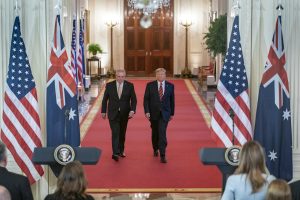Australia is accustomed to navigating the world in conjunction with a cadre of like-minded states. These states frequently work intimately on issues of the global commons like trading rules and freedom of navigation, as well as a more narrow set of interests like intelligence gathering. The Five Eyes network is a prime example. For a middle power like Australia, such a network provides an enormous amount of security and shelter.
Since World War II, this network of like-minded has had the United States as its central pole. Yet this position is challenged by the looming second Donald Trump presidency. How does Australia approach a world where the idea of the U.S. being a “like-mind” becomes questionable?
Central to Trump’s worldview is a suspicion of alliances. As Ivan Krastev has recently stated, Trump “sees America as the hostage of the American-led world.” He sees alliances as burdens. For Trump the ability to do as he pleases is paramount. He believes he has no responsibilities, no duties to others, and that people who do act towards a common good are chumps and losers. He then projects these personal impulses onto American foreign policy.
That the U.S. itself has set most of the rules of the current international order is of little importance to Trump. It’s the concept of rules in general that Trump finds burdensome. This places him in stark contrast with how Australia sees the world.
Australians, by their very disposition, love rules. Potentially a little too much, given how much the country enjoys browbeating itself into line, and how enthusiastically “safetyism” has been embraced by the country’s governments and institutions. It is one reason why such a chaotic and lawless personality like Trump finds little traction in the country. He offends Australia’s national sensibilities.
Yet, in terms of Australia’s foreign policy, a strong international system where rules are adhered to, international law respected, and mutually beneficial cooperation is innate is essential to Australia’s security and prosperity. A world of strong multilateral institutions where Australia can negotiate its case and find partners with common interests to form more powerful blocs is vital to its national interests. Australia is also very good at navigating this system.
Yet such an approach to the world is an anathema to Trump. In understanding Trump’s worldview there is a tendency to frame him as an “isolationist” – someone who wants the U.S. to retreat from the world. Yet this misdiagnoses how he thinks. Rather than being an isolationist, Trump is psychologically – if not ideologically – aligned with authoritarian regimes around the world. He views dictators as impressive for having captured their states, for having transcended the burdens of process and accountability. He admires how they have made themselves the only institution. This is what Trump lusts after.
Giving people the credit for fully understanding their votes, there are also 77 million people in the U.S. who also believe that Trump should be the only institution. This is something that needs to be respected by Australia, even as it proves incredibly confronting. Undoubtedly, Australia has the pragmatism to be able to navigate this reality as best it can.
But this doesn’t mean Australia shouldn’t stand up for its interests when dealing with Trump. As former Prime Minister Malcolm Turnbull has explained, Trump expects submission, but he doesn’t respect it. It means a friendly, but firm, approach to interacting with him is essential to secure the significant cooperative interests Australia has with the U.S. Both in terms of trade and security.
Yet the other reality is that the U.S. is a highly decentralized state, and despite what 77 million Americans may want, fully capturing the power of foreign dictators will be incredibly difficult for Trump. Somewhat ironically, “states rights” will now become a central pillar of American progressive politics.
Within this decentralization are also the habits and mores of the population. Despite how people may vote, there’s enough liberalism – in the classical sense – built into people’s daily behavior that will make the U.S. an incredibly difficult ship to shift course dramatically.
It is also important to recognize that a country is more than its leadership – and the United States is a massive country. Despite Trump’s electoral victory, there is still an awful lot of people in the country – people in positions of authority – who do continue to share like-minded values with Australia.
The positive case for Trump is that during the next four years, the importance of liberal principles, alliances, multilateralism, rules, norms, and common goods will become more apparent. The shock of Trump may actually create a counterforce that expands global like-mindedness.
































